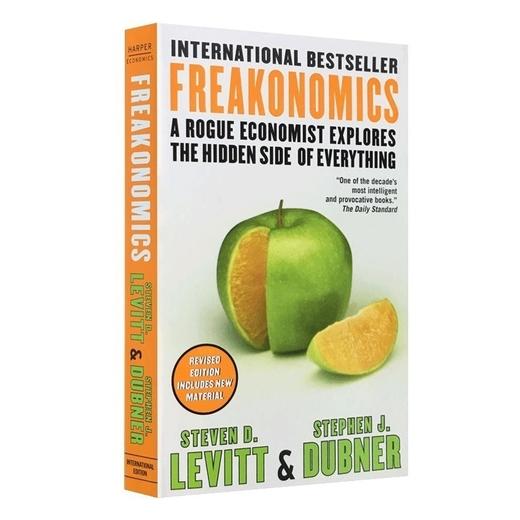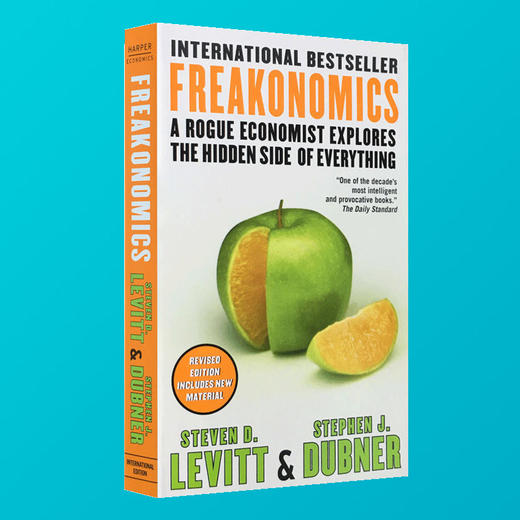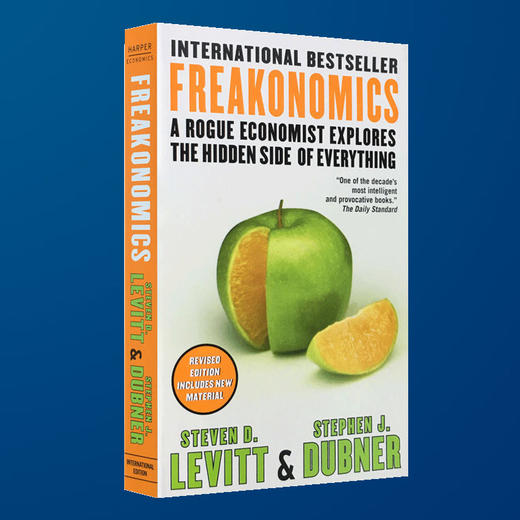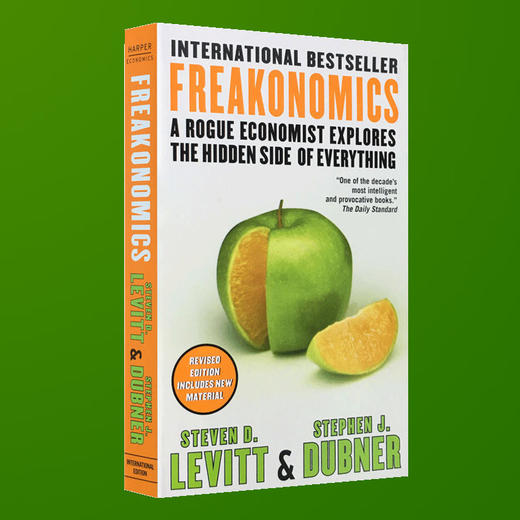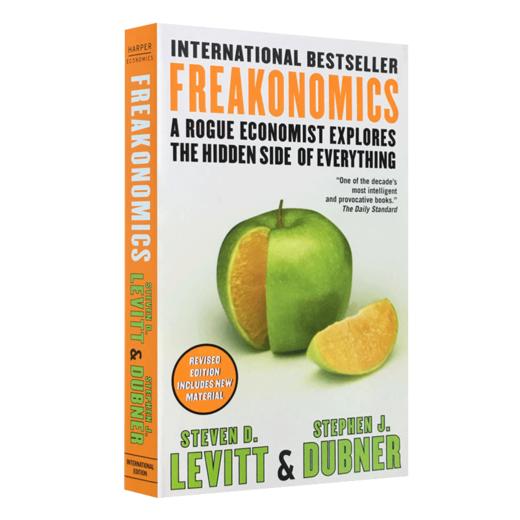正版 英文原版经济书 魔鬼经济学 Freakonomics 史蒂芬 经济学行政人力资源管理类书 英文版进口书
| 运费: | ¥ 0.00-999.00 |
| 库存: | 721 件 |
商品详情
 书名:Freakonomics魔鬼经济学
书名:Freakonomics魔鬼经济学
作者:Steven D. Levitt; Stephen J. Dubner
出版社名称:HarperCollins
出版时间:2009
语种:英文
ISBN:9780061956270
商品尺寸:10.6 x 2.1 x 17.1 cm
包装:简装
页数:330 Freakonomics《魔鬼经济学》关于聪明人怎样看世界的书,畅销数十个国家的大众经济学经典。
Freakonomics《魔鬼经济学》关于聪明人怎样看世界的书,畅销数十个国家的大众经济学经典。
逃出认知囚笼,以经济学方式探索日常生活背后的世界,打破惯性思维,解决看似不可能解决的问题。
革命性的思考、引人入胜的故事、不同寻常的分析,揭示事物表象之下真实的一面。
当今全球有趣的大脑,教你如何更有效、更有创造力、更理智地观察和思考。
亚马逊、《纽约时报》、《华尔街日报》、《华盛顿邮报》、《经济学人》等全球各大媒体推荐。
精彩书评:
“列维特与都伯纳巧妙地连类比物,通过对比乍看起来毫无关联的话题,挖掘富于启发性的真理,这让《魔鬼经济学》读起来妙趣横生。《魔鬼经济学》是一部优秀的著作,旁征博引了大量难以置信却又引人入胜的历史资料,这让作者有别于通俗社会学家之流。”——《纽约时报》
“假如经济学界也有‘夺宝奇兵’,那一定会是史蒂芬·列维特,他是一个特立独行的寻宝猎人,凭着自己的智慧、胆识和离经叛道获得了成功……《魔鬼经济学》读起来就像一部侦探小说……经济学家生怕手中资本贬值,往往吝于褒奖。因此,我费尽心思地想从这本书里挑刺儿,但我还是放弃了。抨击《魔鬼经济学》就像抨击热巧克力圣代……圣代上的樱桃就是列维特的合著者史蒂芬·都伯纳。身为记者,他显然了解自己所写的内容,娓娓道来的文风让你时而忍俊不禁,时而瞠目结舌。都伯纳先生是很难得一见的珍宝,列维特先生能找到他,是我们的幸事。”——《华尔街日报》
“愉快的阅读体验……实际上,本书展示了平淡无奇、陈旧迂腐的经济学在刨根问底、深谙其道的经济学家手中可以起到什么作用……材料引人入胜……本书总能找到本身趣味无穷又能对更广泛的议题富有启发意义的问题,进而用别出心裁的方式做出解答。”——《经济学人》
“引人关注且始终富于趣味性的作品,提出了很多真知灼见,充满了惊喜……《魔鬼经济学》中的有趣观点层出不穷。”——《华盛顿邮报图书世界》
“我们自以为了解世界的运转方式,但实则不然……《魔鬼经济学》利用经济学和翔实的数据质疑我们对万事万物的先入为主之见……读罢之后,你不仅知道了几则可在聚会上讲的趣闻逸事,还会以更加批判的眼光看待许多所谓的真相。”——《哈佛商业评论》
“发人深省、引人入胜……光是那些冷知识就能值回标价了……史蒂芬·列维特自称是无所不能的知识界侦探,但凡是引起他兴趣的人类行为之谜,他都可以揭开。这么说或许有些大言不惭,但《魔鬼经济学》证明,这么说是有底气的。”——《纽约时报书评》
“请设想一个有着天马行空思维、绝顶聪明的经济学家,再设想他只有9岁,想了解一切,这就是史蒂芬·列维特的基本形象……每一章都是一次发人深省的实地考察,就像马尔科姆·格拉德维尔在《引爆点》和《眨眼之间》两部书中对人性的探索一样。”——《时代周刊》
“史蒂芬·列维特拥有全美国有意思的头脑,而《魔鬼经济学》读起来就像在阳光灿烂的夏日同他一起悠闲地散步,他举起手摇了摇手指,便颠覆了一切你所理解的真理。做好为之叹服的准备。”——马尔科姆·格拉德维尔
In the summer of 2003, the New York Times Magazine sent Stephen J. Dubner, an author and journalist, to write a profile of Steven D. Levitt, a heralded young economist at the University of Chicago. Levitt was not remotely interested in the things that interest most economists. More...
Instead, he studied the riddles of everyday lifefrom cheating to crime to child-rearingand his conclusions turned the conventional wisdom on its head. For instance, he argued that one of the main causes of the crime drop of the 1990s was the legalization of abortion twenty years earlier. (Unwanted children have a greater likelihood of becoming criminals; with so many unwanted children being aborted in the 1970s, the pool of potential criminals had significantly shrunk by the 1990s.) The Times article yielded an unprecedented response, a deluge of interest from thousands of curious, inspired, and occasionally distraught readers. Levitt and Dubner collaborated on a book that gives full play to Levitts most compelling ideas. Through forceful storytelling and pungent insight. Freakonomics reminds us all that economics is, at root, the study of incentiveshow people get what they want, or need, especially when other people want or need the same thing. Among the questions it answers: Which is more dangerous, a gun or a swimming pool? If drug dealers make so much money, why do they still live with their mothers? What makes a perfect parent? And, of course: What do schoolteachers and sumo wrestlers have in common? (Answer: they both cheat.) 在Freakonomics《魔鬼经济学》中,列维特和史蒂芬·都伯纳取材日常生活,以经济学的方式来探索日常事物背后的世界:念书给婴儿听会不会使他日后成为一个好学生?游泳池比枪支还危险?贩毒集团的结构其实和麦当劳的组织很像,而且基层员工和小弟都没赚头,钱都进了总裁和大哥的口袋;父母教养方式的差异对孩子影响不大等。
在Freakonomics《魔鬼经济学》中,列维特和史蒂芬·都伯纳取材日常生活,以经济学的方式来探索日常事物背后的世界:念书给婴儿听会不会使他日后成为一个好学生?游泳池比枪支还危险?贩毒集团的结构其实和麦当劳的组织很像,而且基层员工和小弟都没赚头,钱都进了总裁和大哥的口袋;父母教养方式的差异对孩子影响不大等。
《魔鬼经济学》中确立了一个有悖于传统智慧的观点:如果说伦理道德代表了我们心目中理想的社会运行模式的话,那么经济学就是在向我们描述这个社会到底是如何运行的。
著名的书评人兰兹·伯格把《魔鬼经济学》比喻成一部侦探小说,说自己在阅读读书的过程中一直都“屏住呼吸”,生怕一呼一吸之间,吹跑书中的那股灵气。在他看来,《魔鬼经济学》的每一个章节都包含了一本一流侦探小说的所有元素。只不过列维特所要侦破的目标不是“找到凶手”,而是“揭开真实世界的伪装”。《魔鬼经济学》书中的几乎每一个字都是对传统智慧的颠覆,他的许多发现被认为是惊世骇俗的,有些甚至会为他引来杀身之祸。
不论从哪个角度来说,这都是一本会让人眼界一新的书。
Which is more dangerous, a gun or a swimming pool?
What do schoolteachers and sumo wrestlers have in common?
How much do parents really matter?
These may not sound like typical questions for an economist to ask. But Steven D. Levitt is not a typical economist. He studies the riddles of everyday life—from cheating and crime to parenting and sports—and reaches conclusions that turn conventional wisdom on its head. Freakonomics is a groundbreaking collaboration between Levitt and Stephen J. Dubner, an award-winning author and journalist. They set out to explore the inner workings of a crack gang, the truth about real estate agents, the secrets of the Ku Klux Klan, and much more. Through forceful storytelling and wry insight, they show that economics is, at root, the study of incentives—how people get what they want or need, especially when other people want or need the same thing.
 史蒂芬•列维特(Steven D. Levitt),芝加哥大学经济学教授,约翰•贝茨•克拉克奖得主(该奖被称为“小诺贝尔奖”),被誉为“当今美国40岁以下久负盛名的经济学家”,他的声誉得到了整个经济学界的公认。列维特1989年毕业于哈佛大学,1994年在麻省理工学院取得经济学博士学位,1997年进入芝加哥大学执教,短短两年时间,列维特就成为芝加哥大学经济学院终身教授。2002年列维特被选为美国科学院经济学部委员。他还担任《政治经济学杂志》(JPE)的编辑和《经济学季刊》(OJE)的编辑。克林顿政府曾经力邀他加入自己的智囊团。小布什总统在大选的时候也把“请到列维特作为犯罪专家”作为拉拢选票的一张底牌。
史蒂芬•列维特(Steven D. Levitt),芝加哥大学经济学教授,约翰•贝茨•克拉克奖得主(该奖被称为“小诺贝尔奖”),被誉为“当今美国40岁以下久负盛名的经济学家”,他的声誉得到了整个经济学界的公认。列维特1989年毕业于哈佛大学,1994年在麻省理工学院取得经济学博士学位,1997年进入芝加哥大学执教,短短两年时间,列维特就成为芝加哥大学经济学院终身教授。2002年列维特被选为美国科学院经济学部委员。他还担任《政治经济学杂志》(JPE)的编辑和《经济学季刊》(OJE)的编辑。克林顿政府曾经力邀他加入自己的智囊团。小布什总统在大选的时候也把“请到列维特作为犯罪专家”作为拉拢选票的一张底牌。
史蒂芬•都伯纳(Stephen J. Dubner),获奖作家、记者、电台和电视名人。他放弃了使他几乎成为摇滚歌星的第1个职业,成为了一名作家,曾就职于《纽约时报》,著有《骚动的灵魂》《一个英雄崇拜者的自白》,另著有儿童图书《长两个肚脐眼的男孩》。
Steven D. Levitt, a professor of economics at the University of Chicago, was awarded the John Bates Clark Medal, given to the most influential American economist under forty. He is also a founder of The Greatest Good, which applies Freakonomics-style thinking to business and philanthropy.
Stephen J. Dubner, an award-winning journalist and radio and TV personality, has worked for the New York Times and published three non-Freakonomics books. He is the host of Freakonomics Radio and Tell Me Something I Don’t Know. It is the quintessential blend of commerce and camaraderie: you hire a real-estate agent to sell your home.
It is the quintessential blend of commerce and camaraderie: you hire a real-estate agent to sell your home.
She sizes up its charms, snaps some pictures, sets the price, writes a seductive ad, shows the house aggressively, negotiates the offers, and sees the deal through to its end. Sure, it a lot of work, but she’s getting a nice cut. On the sale of a$300, 000 house, a typical 6 percent agent fee yields $18,000. Eighteen thousand dollars, you say to yourself. That’s a lot of money. But you also tell yourself that you never could have sold the house for $300,000 on your own. The agent knew how to-what’s that phrase she used? —“maximize the house’s value.” She got you top dollar, right?
Right?
A real-estate agent is a different breed of expert than a criminologist, but she is every bit the expert. That is, she knows her field far better than the layman on whose behalf she is acting. She is better informed about the house’s value, the state of the housing market, even the buyers frame of mind. You depend on her this information. That, in fact, is why you hired an expert.
As the world has grown more specialized, countless such experts have made themselves similarly indispensable. Doctors, lawyers, contractors, stockbrokers, auto mechanics, mortgagebrokers, financial planners: they all enjoy a giganticinformationaladvantage. And they use that advantage to help you, the person who hired them, get exactly what you want for the best price.
Right?
It would be lovely to think so. But experts are human, and humans respond to incentives. How any given expert treats you, therefore, will depend on how that expert’s incentives are set up.
Sometimes his incentives may work in your favor. For instance a study of California auto mechanics found they often passed up a small repair bill by letting failing cars pass emissions inspections—the reason being that lenient mechanics are rewarded with repeat business. But in a different case, an expert’s incentives may work against you. In a medical study, it turned out that obstetricians in areas with declining birth rates are much more likely to perform cesarean-section deliveries than obstetricians in growing areas—suggesting that, when business is tough, doctors try to ring up more expensive procedures.
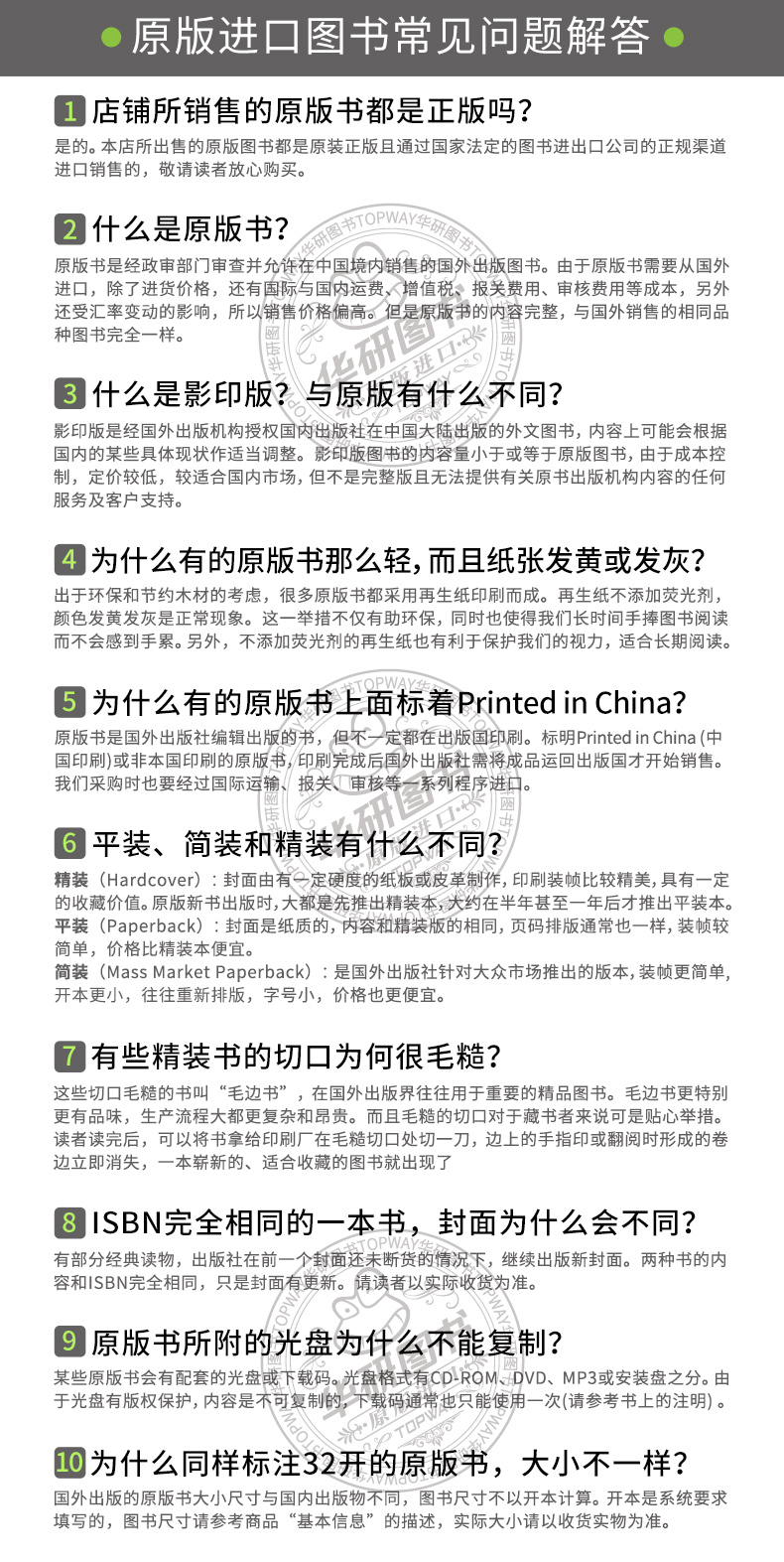
- 华研外语 (微信公众号认证)
- 本店是“华研外语”品牌商自营店,全国所有“华研外语”、“华研教育”品牌图书都是我司出版发行的,本店为华研官方源头出货,所有图书均为正规正版,拥有实惠与正版的保障!!!
- 扫描二维码,访问我们的微信店铺
- 随时随地的购物、客服咨询、查询订单和物流...
